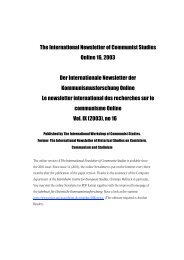VOL. XVI (2010), NO 23 - The International Newsletter of Communist ...
VOL. XVI (2010), NO 23 - The International Newsletter of Communist ...
VOL. XVI (2010), NO 23 - The International Newsletter of Communist ...
Erfolgreiche ePaper selbst erstellen
Machen Sie aus Ihren PDF Publikationen ein blätterbares Flipbook mit unserer einzigartigen Google optimierten e-Paper Software.
<strong>The</strong> <strong>International</strong> <strong>Newsletter</strong> <strong>of</strong> <strong>Communist</strong> Studies Online <strong>XVI</strong> (<strong>2010</strong>), no. <strong>23</strong> 60<br />
Hernán Camarero, Universidad de Buenos Aires (Argentina):<br />
Félix Weil y un libro pionero sobre la historia del movimiento obrero y las<br />
izquierdas en la Argentina.<br />
Abstract: „Die Arbeiterbewegung in Argentinien. Ein Beitrag zu ihrer Geschichte“ is a rare<br />
and exceptional historical piece. Published only once in the German city <strong>of</strong> Leipzig in<br />
19<strong>23</strong>, it remained since then in an almost complete ignorance to Argentine readers and is<br />
still awaiting a local edition in Spanish. An examination <strong>of</strong> its pages is an appropriate task<br />
and very useful. First, because we can learn about their author, the Argentine-German<br />
Felix Weil, a singular intellectual figure who has a fascinating biography which mingled<br />
his activities as a prosperous businessman in the field <strong>of</strong> agricultural trade with those <strong>of</strong> a<br />
<strong>Communist</strong> activist and Marxist theorist, in addition to its known role as a financial<br />
promoter <strong>of</strong> the “Frankfurt School”. He spent his life between those two roles and different<br />
territories: Argentina and Europe. Along with his exotic biography his book allows us to<br />
approach one <strong>of</strong> the first attempts at historical reconstruction <strong>of</strong> the origins <strong>of</strong> the labor<br />
movement and the Left in Argentina. This essay will outline some pr<strong>of</strong>iles <strong>of</strong> Felix Weil’s<br />
work and analyze the context and the contents trying to point out its main contributions<br />
and limitations.<br />
Die Arbeiterbewegung in Argentinien. Ein Beitrag zu ihrer Geschichte es una pieza histórica<br />
extraña y excepcional. Publicado por única vez en la ciudad alemana de Leipzig en 19<strong>23</strong>, 1<br />
se mantuvo, desde entonces, en un casi absoluto desconocimiento para los lectores<br />
argentinos y aún espera una edición local en castellano. Un examen de sus páginas resulta<br />
una tarea apropiada y muy útil. Por un lado, porque nos permite conocer otras facetas de su<br />
autor, el argentino-germano Félix Weil, una figura intelectual singular, de apasionante<br />
biografía, en la que se entremezclaron exóticamente sus actividades de próspero<br />
empresario en el rubro de la comercialización agrícola, militante comunista y teórico<br />
marxista, además de su conocida función como impulsor neutral y financiero de la “Escuela<br />
de Frankfurt”. Un hombre que transitó entre el ámbito local y el escenario europeo e<br />
internacional. Por otro lado, porque nos posibilita acercarnos a uno de los primeros intentos<br />
de reconstrucción historiográfica acerca de los orígenes del movimiento obrero y de las<br />
izquierdas en la Argentina. En este ensayo delinearé algunos perfiles sobre el creador de<br />
esta obra, analizaré el contexto de producción de la misma e indagaré en su contenido,<br />
intentando señalar sus principales aportes y limitaciones.<br />
***<br />
Comencemos con un breve recorrido biográfico de nuestro personaje. Lucio Félix José Weil,<br />
tal su nombre completo, nació en Buenos Aires en febrero de 1898. Su padre, Hermann<br />
Weil, era un comerciante de granos judeo-alemán, que se había instalado en la Argentina<br />
pocos años antes, donde logró amasar un voluminoso capital a partir de sus operaciones de<br />
exportación de cereales al continente europeo. Su empresa, Weil Hermanos & Cia, ejerció<br />
hasta 1930, junto a otras dos grandes firmas internacionales, el control del mercado de<br />
cereales del país. Tempranamente, en 1907, Félix fue enviado a recibir educación en las<br />
tierras del kaiser Guillermo II, en donde vivió los siguientes trece años; pronto, también<br />
1 Felix Weil: Die Arbeiterbewegung in Argentinien. Ein Beitrag zu ihrer Geschichte, Leipzig, C. L. Hirschfeld, 19<strong>23</strong>.














